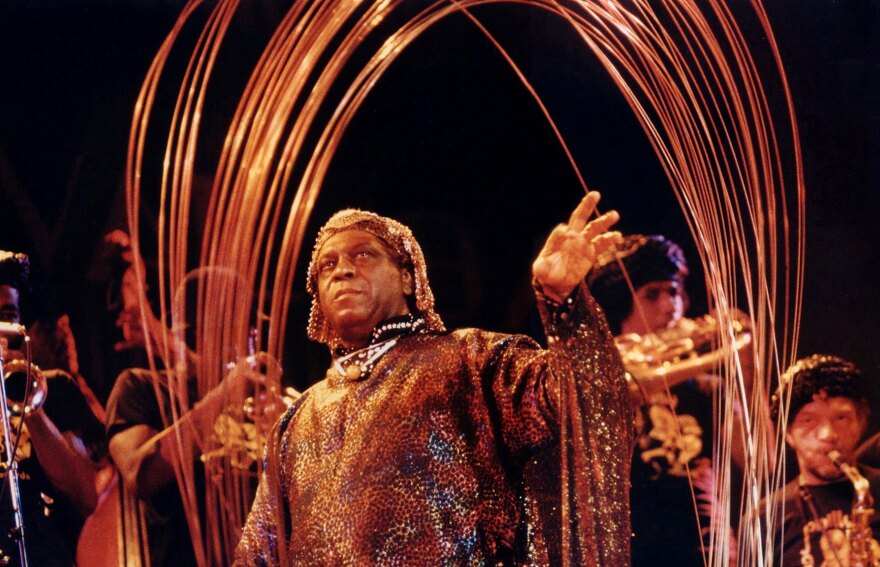The first piece of music heard in Sun Ra: Do the Impossible, a magnificent new feature-length documentary, is one of the only songs in the film that its subject didn’t compose himself. It comes via rare footage of Sun Ra at a 1977 solo piano concert in Venice, performing “Over the Rainbow” — the yearning centerpiece of Harold Arlen’s songbook for The Wizard of Oz. The scene is a haunting and humanizing way to open a documentary about one of music’s staunchest nonconformists. Like everything else in the film, it rings with deliberate intention.
“‘Over the Rainbow’ was a favorite song of his,” Christine Turner, the film’s director, tells WRTI. “It was something that he played, I think, over a hundred times in concert, primarily as a solo piece. And so this song held a lot of meaning to him. It’s also a song that is incredibly familiar to so many of us.” So while the Venice tape will be new to almost everyone who sees Turner’s documentary, it also extends a reassuring hand, to connoisseurs and newcomers alike. “That footage is really beautiful and astounding,” she says, “and we thought it was a great way into the film — and we think that the song, of course, echoes so many of his ideas.”
Sun Ra: Do the Impossible, which screens on Aug. 2 at the Wilma Theater as part of the BlackStar Film Festival, is in many respects a film about those ideas. They surface in his writings, both poetic and polemical, and in some of the many thoughtful, aphoristic interviews he gave before his earthly departure in 1993. Along with current members of the Sun Ra Arkestra, notably the centenarian Marshall Allen and fellow saxophonist Knoel Scott, the film mines insights from scholars like Fred Moten and Brent Hayes Edwards, musicians like Nicole Mitchell and King Britt, and critics including Harmony Holiday and Marcus J. Moore. (Full disclosure: I am also in the film.)

Turner’s previous films include J'Nai Bridges Unamplified, which broadcast on PBS’ American Masters series, and Lynching Postcards: ‘Token of a Great Day,’ which was shortlisted in the Documentary Short Subject category at the 2022 Academy Awards. Working with Firelight Media — whose co-founder, Stanley Nelson, is an executive producer of the film — Turner sought to explore Sun Ra’s legacy in a way that revealed the artist and his lived experience even as it took seriously the dimensions of his self-made intergalactic myth, which in many ways resides at the heart of his music.
“Sun Ra has often been written off as this kooky person, or maybe even a charlatan,” Turner says. “And we really wanted to put a new lens on him; it felt like the time was right for a reappraisal. During the course of our research, it became really clear that this was an incredibly well-read person, somebody who really was dedicated to a kind of intellectual life from very early on in his lifetime.”
The film follows that thread throughout Sun Ra’s life on this planet, which began in Birmingham, Alabama — where he was born Herman Poole Blount, and known as “Sonny” — and took him to Chicago, then New York. Through a fastidious yet stylish arrangement of archival materials, we encounter his many facets: keyboardist, composer, philosopher, organizer, proselytizer, poet. One former musical associate mentions the C-word — “cult” — in regard to the strict discipline that Sun Ra exerted with his Arkestra members, especially after the band moved into a rowhouse in Philadelphia’s Germantown neighborhood, which still serves as a base of operations.

When Sun Ra: Do the Impossible had its world premiere at the TriBeca Film Festival in June, it was greeted with vocal enthusiasm. The film received major funding from the National Endowment for the Humanities, along with the Ford Foundation, the Wyncote Foundation and others. If all goes according to plan, it will be broadcast on PBS’ American Masters series in 2026. In the meantime, the BlackStar Film Festival provides a welcome opportunity to see it — in person at the Wilma or digitally, through a virtual screening link.
“I’m most excited to screen it in Philadelphia, where the Arkestra has spent so many years, and where there is such a strong following,” Turner says. “In some ways it feels almost like a hometown screening. And so I’m excited to hear what audiences think.”
Sun Ra: Do the Impossible screens in person at 2 p.m. on Saturday, Aug. 2 at the Wilma Theater; it will also be available digitally for 48 hours, starting at 3:30 p.m. Tickets and information via the BlackStar Film Festival.


